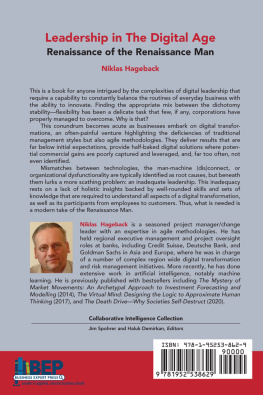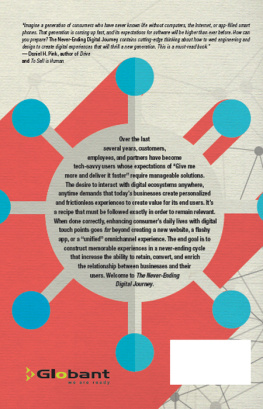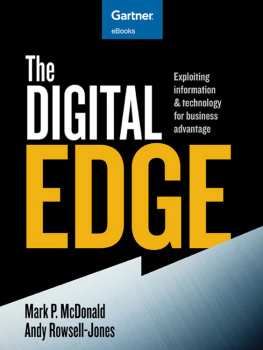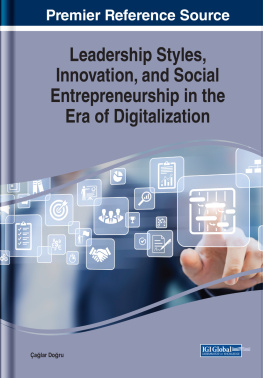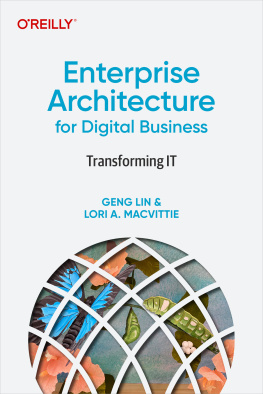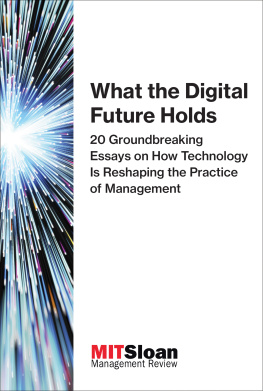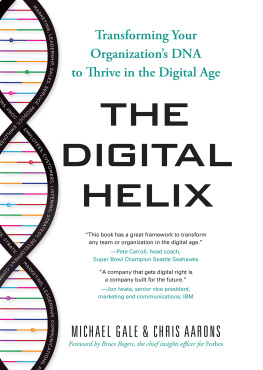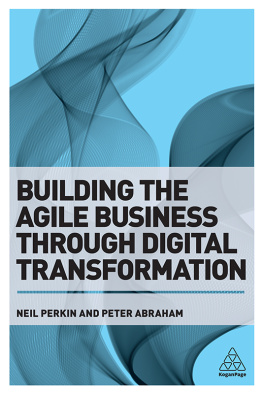
Leadership in The Digital Age
Leadership in The Digital Age
Renaissance of The Renaissance Man
Niklas Hageback

Leadership in The Digital Age: Renaissance of The Renaissance Man
Copyright Business Expert Press, LLC, 2021.
All rights reserved. No part of this publication may be reproduced, stored in a retrieval system, or transmitted in any form or by any meanselectronic, mechanical, photocopy, recording, or any other except for brief quotations, not to exceed 250 words, without the prior permission of the publisher.
First published in 2021 by
Business Expert Press, LLC
222 East 46th Street, New York, NY 10017
www.businessexpertpress.com
ISBN-13: 978-1-95253-862-9 (paperback)
ISBN-13: 978-1-95253-863-6 (e-book)
Business Expert Press Collaborative Intelligence Collection
Collection ISSN: 2691-1779 (print)
Collection ISSN: 2691-1795 (electronic)
Cover image licensed by Ingram Image, StockPhotoSecrets.com
Cover and interior design by S4Carlisle Publishing Services Private Ltd., Chennai, India
First edition: 2021
10 9 8 7 6 5 4 3 2 1
Printed in the United States of America.
Dedication
To Aarik and Bernard
Abstract
This is a book for anyone intrigued by the complexities of digital leadership that require a capability to constantly balance the routines of everyday business with the ability to innovate. Finding the appropriate mix between the dichotomy stability and flexibility has been a delicate task that few, if any, corporations have properly managed to overcome. Why is that? This conundrum becomes acute as businesses embark on digital transformations, an often painful venture highlighting the deficiencies of traditional management styles but also agile methodologies. They deliver results that are far below initial expectations, provide half-baked digital solutions where potential commercial gains are poorly captured and leveraged, and, far too often, are not even identified. Mismatches between technologies, the manmachine (dis)connect, or organizational dysfunctionality are typically identified as root causes, but beneath them lurks a more scathing problem: an inadequate leadership.
And it is generally not because of a lack of technological expertise or poor people management that these skills are often sufficiently resourced. The leadership problem is, instead, of a more imperative nature, this as the digital transformation comes to challenge the business to its core: How do we provide customer value, and how do we organize ourselves in the most (cost-)efficient way?
In essence, it takes aim at a corporations raison dtre and, as such, goes far beyond technical solutions, corporate structure, or indeed even an in-depth understanding of products and markets, this as the digital transformation explicitly (and implicitly) transcends all of these perspectives in its aspiration toward value maximization. By acknowledging these cojoined complexities, elements of what it is that the digital leadership requires can be formulated, namely, a holistic approach capable of incorporating them, facilitated by a cognitive capacity that can craft commercially viable products and services.
But in the age of the specialists that are drilling down in ever more granular minutiae, do there even exist generalists equipped with this holistic mindset, and, if so, what do they look like?
To start with, there are role models that provide inspiration and are worth looking at, but these bring us back a few hundred years in time. Enter the Renaissance Man.
Keywords
agile; change management; collective intelligence; creativity; digital leadership; digital transformations; innovation; project management; renaissance man
Contents
I would like to express my warmest gratitude to Scott Isenberg and his teams at Business Expert Press and S4Carlisle, respectively, for helping to turn a raw manuscript into a book. I would also like to thank Jim Spohrer, Cognitive OpenTech IBM, for his many valuable comments and insights, which were of great help in my work.
Technology alone is not enough. Its technology married with the liberal arts, married with the humanities, that yields us the results that make our hearts sing.
Steve Jobs, iconic digital leader (1955 to 2011)
The world is in the midst of a digital transformation that is transcending all industries. It is highlighted by two emerging trends that businesses are forced to adhere to:
All firms are now technology firms, whether they acknowledge it or not. This is because upgrades and advances in business models rest on digital solutions, mainly software applications, either developed in-house or third-party tools, customized for bespoke value-added products and services.
There is a reduced reliance on quantity of employees in favor of finding, grooming, and retaining quality employees. These typically come with a high level of technological competence, in addition to specific domain expertise. Deploying large numbers of employees to deal with a business challenge is no longer a viable solution, but rather seeking out the extraordinary manmachine connect. This is an effect of machines now starting to outmatch large segments of the work force. To fully benefit from these developments, a drastically altered organizational arrangement with a different type of leadership is required.
As a consequence of this changing landscape, most firms are now finding themselves in the proverbial Darwinian survival mode. It is a situation triggered by many factors incidentally acting in concert: fickle customer demands, increased automation at all levels of the organization to push down costs, and growing complexity from operating in fragmented markets defined by differing regulations and heightened political risks. It looks quite like a race to the bottom, with the winner only temporarily taking it all, or at least most of it. But with the low barriers to technical innovation, this dominance is often of a fluid character, and so this race is set to recur over and over again. The assumed longevity of premium branding and customer loyalty is quickly becoming obsolete. In this highly dynamic setting, where change in its many aspects overwhelms all commercial activities, and that too at an accelerating rate, what tools do we have at our disposal to handle and tame it to our advantage? Well, agile is currently the buzzword that businesses across industries and geographies hang on to. That agile saw its genesis in the software industry was not by chance. The long development cycles, as prescribed by traditional project management methods, led to deliverables that were often already technically antiquated and way off the mark in terms of functionality at the time of sign-off and deployment. Something more flexible was needed in order to be able to incorporate the ongoing demands for change from customers and increased technical complexity and innovation, features reflecting an industry that was in a constant state of flux. To solve this conundrum, the agile philosophy took aim at two key principles:
Keep bureaucracy at a minimum by, as far as possible, eliminating formal process and protocol, and
Break down hierarchies and flatten the organization with a focus on concentrated cross-functional teamwork, which can include the end users, empowered with executive decision-making power.
Although straightforward, agile practices keep everyone on their toes. Daily sprints ensure that no slackers need apply and that everyone is held accountable for their productivity. Thus, they are highly demanding yet well endowed if properly performed. Numerous testimonies agree on how products have come to much more closely reflect the customers actual needs and are delivered in a notably faster and more labor-efficient manner. Agile, in its many variations, is therefore now an acclaimed project management standard. But like previous popular project- and strategic management concepts that eventually faded into oblivion, is the same fate also awaiting the agile framework?
Next page
